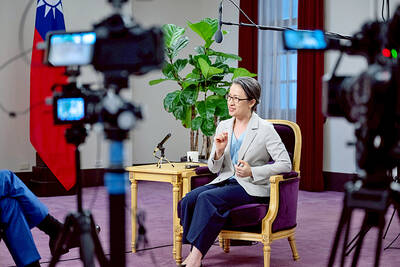Taipei-born Terry Tang, who has been leading the Los Angeles Times newsroom since January on an interim basis, on Monday was formally named executive editor.
She is the first woman to hold the post in the newspaper’s 142-year history.
Since being tapped for the interim role, Tang has reorganized the newsroom, formed her own leadership team and placed a heavier emphasis on traditional reporting, the LA Times said in a report announcing the appointment.

Photo: AP
“Terry in short order has demonstrated the capability of building on our legacy of excellence in journalism with stories that matter,” owner Patrick Soon-shiong said in a statement.
Tang, 65, has deep roots in southern California. She was born in Taipei, and her family spent a few years in Japan before emigrating to Los Angeles when she was six.
She graduated from Yale University with a bachelor’s degree in economics and earned a law degree from the New York University School of Law.
Before joining the LA Times, she worked for two years at the American Civil Liberties Union, where she served as director of publications and editorial.
Before that, she worked at the New York Times for 20 years in numerous roles.
Tang’s appointment comes during a tumultuous year for the news institution.
In January, the LA Times said that it would lay off at least 115 employees — more than 20 percent of the newsroom — in one of the company’s largest-ever staff cuts.
Tang replaces Kevin Merida, who abruptly left in late January after a two-and-a-half-year tenure.
Tang previously led the Opinion section for nearly two years after joining the LA Times in 2019 as deputy op-ed editor.
She will continue to oversee Opinion.

China might accelerate its strategic actions toward Taiwan, the South China Sea and across the first island chain, after the US officially entered a military conflict with Iran, as Beijing would perceive Washington as incapable of fighting a two-front war, a military expert said yesterday. The US’ ongoing conflict with Iran is not merely an act of retaliation or a “delaying tactic,” but a strategic military campaign aimed at dismantling Tehran’s nuclear capabilities and reshaping the regional order in the Middle East, said National Defense University distinguished adjunct lecturer Holmes Liao (廖宏祥), former McDonnell Douglas Aerospace representative in Taiwan. If

TO BE APPEALED: The environment ministry said coal reduction goals had to be reached within two months, which was against the principle of legitimate expectation The Taipei High Administrative Court on Thursday ruled in favor of the Taichung Environmental Protection Bureau in its administrative litigation against the Ministry of Environment for the rescission of a NT$18 million fine (US$609,570) imposed by the bureau on the Taichung Power Plant in 2019 for alleged excess coal power generation. The bureau in November 2019 revised what it said was a “slip of the pen” in the text of the operating permit granted to the plant — which is run by Taiwan Power Co (Taipower) — in October 2017. The permit originally read: “reduce coal use by 40 percent from Jan.

‘SPEY’ REACTION: Beijing said its Eastern Theater Command ‘organized troops to monitor and guard the entire process’ of a Taiwan Strait transit China sent 74 warplanes toward Taiwan between late Thursday and early yesterday, 61 of which crossed the median line in the Taiwan Strait. It was not clear why so many planes were scrambled, said the Ministry of National Defense, which tabulated the flights. The aircraft were sent in two separate tranches, the ministry said. The Ministry of Foreign Affairs on Thursday “confirmed and welcomed” a transit by the British Royal Navy’s HMS Spey, a River-class offshore patrol vessel, through the Taiwan Strait a day earlier. The ship’s transit “once again [reaffirmed the Strait’s] status as international waters,” the foreign ministry said. “Such transits by

Taiwan is doing everything it can to prevent a military conflict with China, including building up asymmetric defense capabilities and fortifying public resilience, Vice President Hsiao Bi-khim (蕭美琴) said in a recent interview. “Everything we are doing is to prevent a conflict from happening, whether it is 2027 or before that or beyond that,” Hsiao told American podcaster Shawn Ryan of the Shawn Ryan Show. She was referring to a timeline cited by several US military and intelligence officials, who said Chinese President Xi Jinping (習近平) had instructed the Chinese People’s Liberation Army to be ready to take military action against Taiwan